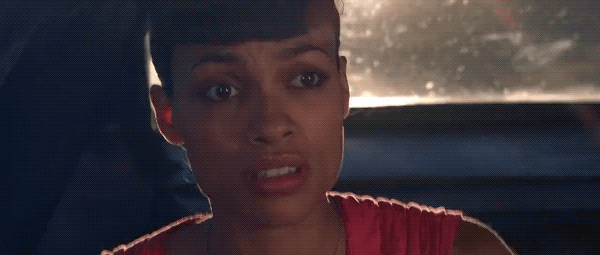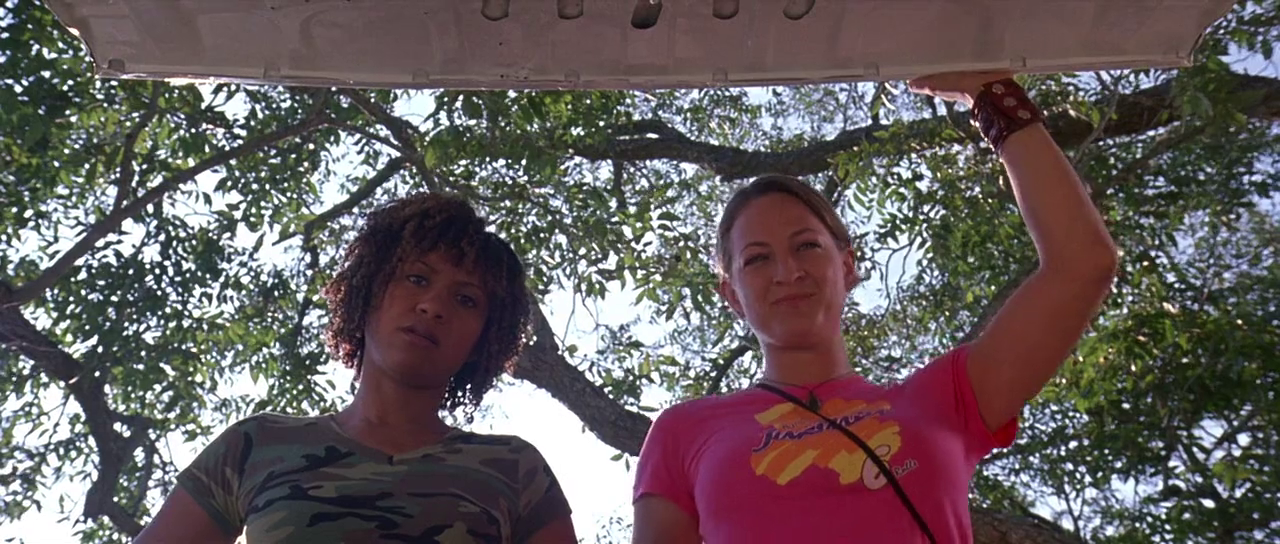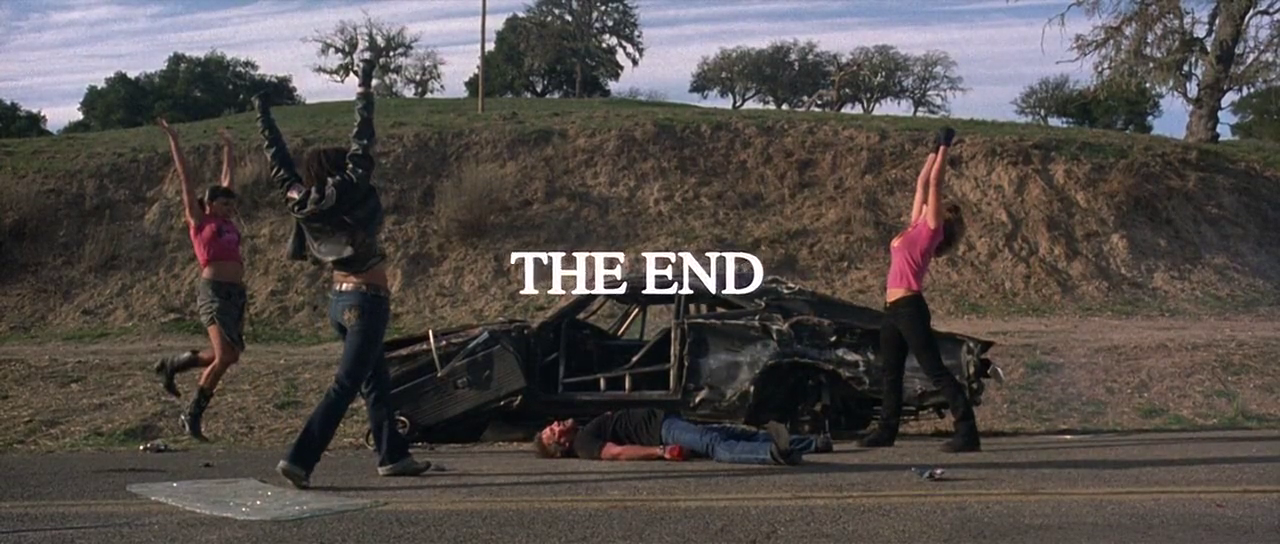by Jason Adams

Every time I see Quentin Tarantino's bifurcated 2007 flick Death Proof I want to write about Death Proof, and every time I write about Death Proof I tell myself I'm going to write about something besides Rosario Dawson's performance in Death Proof... and every time I spectacularly fail at this mission. This "Great Moments in Horror Actressing" post you're now reading is further proof, dead proof, of just that. It's just there is that moment, that single moment seen above, where Tarantino's camera zooms in on Dawson's face as her worry melts into absolute exaltation, and it is by my humble estimate one of the greatest, most electric close-ups in cinematic history. Just that!
But we are, like so much of this movie, zooming right on ahead of ourselves. Just what is it about that moment that makes all the hairs on my arms stand on end?
Why, after dozens of screenings in the past thirteen years do I still spend the second half of Death Proof bubbling over with an almost animalistic glee, a frenzy, my own one-time worry melting into its own sort of triumphant passenger-seat exaltation?
At the exact midpoint of the movie, right after the first group of unlucky ladies have had their not-so meet-cute with Stuntman Mike's front bumper, we cut to the local hospital where a a sheriff-type and his deputy-son (nevermind that these are carry-over characters from Planet Terror, Robert Rodriguez' conjoined Grindhouse feature) are assessing the accident's gruesome aftermath. Sheriff Earl (Michael Parks) speculates -- which is to say he spells out Tarantino's raison dêtre for the yokels in the back row -- that Stuntman Mike is a serial killer who "used a car not a hatchet" to murder "them pretty little gals," probably as "a sex thing." Basically what Earl tells us is, hey, in case you didn't notice you're watching a Slasher Movie.
And everybody knows, whether they've read Carol J. Clover or not, that if you've got a Slasher Movie then you've got a Final Girl -- the Killer and the Survivor, two exact and opposite forces smashing into each other like two tricked-out cars on a deserted highway at night. That's the pseudo-religious spectacle we've come here to witness.
Of course just because Tarantino spells it out for us doesn't mean he's playing it so simple, and Death Proof on every front, but especially on its Final Girl one, gets its rocks off by subverting every trope. Why give us one Final Girl when he can give us a kick-ass Final Girl Gang full of 'em?

The reason why I side-eye myself for always wanting to write exclusively about Rosario Dawson's transcendentally appealing work is she doesn't do it on her own, and I'm not even just talking about her cohorts in the film's generally-better-loved second half, the Tracie Thoms and Zoe Bells and Mary Elizabeth Winsteads of it all. I do this film a disservice under-appreciating all of the terrific actressing done in its unwieldier front load -- that darker half, which follows the trials and tribulations and long long conversations between DJ Jungle Julia (Sydney Tamiia Poitier) and her pals, most prominently Vanessa Ferlito as Arlene and Jordan Ladd as Shanna, with some distressing support from Rose McGowan, is the underbelly that makes the film's second half all the more exhilarating.
Tarantino has still by my measure not gotten enough credit for the way he upsets and explodes long routine horror structures with this flick. Imagine Drew Barrymore's opening scene in Scream kaleidoscoped and stretched out to forty-five minutes. It's probably about as long as Marion Crane takes to make it to that shower in Psycho? It's all so beautifully mangled and twisted-up that indeed, Tarantino felt that need to have Sheriff Earl come out at film's midpoint and make sure we knew what was happening -- speaking of Hitchcock's masterpiece it feels like a nod towards that film's deus-ex-psychiatrist ending, with all of Norman Bates' eccentricities explained away, tucked under that little prison blanket. Here is what is happening and why, The End!

We spend a good forty-five minutes just chilling with Death Proof's first group of girls, riffing on all the shit Tarantino loves to riff on, until suddenly a tire-tread peels one of their pretty little faces off. Arlene is set up through that entire first half of the movie to be our Final Girl, for those on the look-out for such things -- Arlene is the one who sees Stuntman Mike, over and over again, and in the grand tradition of all the Laurie Strodes they are the ones Who See And Survive. Until, you know, not.
Tarantino is hardly the first person to play with the Final Girl tropes in this way -- Hitchcock did it before there even were the tropes. But there is something ever so slightly poppy and bright and revolutionary in the way that Death Proof's giddy second half picks up the chess pieces that its first sad half scattered, drops them right back down on the board, and screams "Checkmate, motherfucker!"
It's there in Rosario Dawson's face as her character of Abernathy discovers the thrill of playing "Ship's Mast" with her daredevil friends Kim and Zoe -- an ebuillance that screams not just survival, but something way bigger than that. There is Life is in that long scene where these women talk about holding hands and trading hand-jobs with their on-set romances, and Life is there in Kim's speech about her weapon of choice giving her the right to do her laundry whenever the hell she wants to do her laundry. Oh and it's very much in the delightful scene at the convenience store where the women gather their dollars together to snatch up the only copy of Italian Vogue in all of Lebanon, Tennessee. These scenes live, they breathe. And these women do too.
And Life, bigger than ever, is there as the gals freeze-frame in mid-air after kicking Stuntman Mike's ass straight down to Heck. Everything dark and sad about Death Proof's first half -- leering overripe frat boys played by Eli Roth, un-returned texts and lap-dances doled out to villains, finds its equal and opposite force alongside Abernathy and her crew of smiling kick-assers. Death Proof drips the Slasher Killer and Final Girl forms straight down into its very DNA, an intertwined double-strand of storytelling itself. So if like me you find yourself head-over in love with Abernathy and that second half I'd wager that speaks well to your sense of humanity -- she's built to last, and last well. Checkmate, motherfucker.
